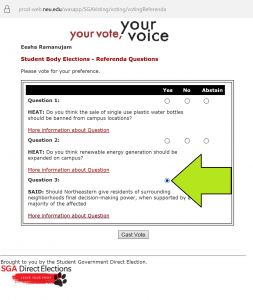Last year, I wrote that our student government had failed us. Under President Eric Tyler and Executive Vice President (EVP) Morgan Helfman’s administration – and many of their predecessors – Northeastern Student Government Association (SGA) was unaccountable, non-transparent, and unrepresentative of the student body. The referenda vetting process in place was borderline autocratic, and student calls for reform were met with defensiveness and bureaucratic roadblocks.
Had you asked me last week about the current state of our student government, I would have told you that under this administration, much has improved. I would have told you that Student Body President Elliot Horen and Executive Vice President Suchira Sharma, along with their executive cabinet, have made impressive strides toward creating a more accountable, representative, and transparent student government.
Over the past week, however, the Horen administration has become embroiled in a controversy surrounding the 2017 Direct Elections voting process, during which it has exhibited a number of the flaws that have historically plagued SGA. Since SGA has failed to make a public statement informing the student body of what has transpired since voting began, I have attempted to provide an overview of the issue and related grievances here.
On March 16, voting began for the 2017 Direct Elections, in which undergraduate students are tasked with electing a new student body president and executive vice president. The two slates vying for the office are Suchira+Paulina, comprised of Suchira Sharma and Paulina Ruiz, and Bender/Grondin, comprised of Alex Bender and Jake Grondin. On the same ballot, students also have the opportunity to vote on three student-written referenda questions. One of these referenda was put on the ballot by Students Against Institutional Discrimination (SAID), a group of which I am part and a question of which I am a co-author. The question proposes that Northeastern’s administration give final decision-making power to the residents of neighborhoods adjacent to campus with regard to proposed community-facing initiatives and development projects that would affect communities such as Roxbury, Mission Hill, Fenway, and the South End.
SAID’s referendum was printed incorrectly on the ballot, with a significant portion of the question missing. The question in full would have read, “Should Northeastern give residents of surrounding neighborhoods final decision-making power, when supported by a majority of the affected neighborhoods’ constituents, in University development and community projects?” The truncated version that SGA printed on the ballot read, “Should Northeastern give residents of surrounding neighborhoods final decision-making power, when supported by a majority of the affected–”.
The question appeared this way on the online voting platform from the time when voting went live at midnight on Thursday, March 16 until approximately 2:00pm the following afternoon (a total of 14 hours, during which approximately 1,500 votes were cast).[1] Students who took the initiative to make their voices heard at the earliest available opportunity were given incomplete information, and many understandably were reluctant to vote “yes” to a question that was unclear to them. Several students reported abstaining on the question because they were confused about the meaning in its incomplete state. SAID has no way of knowing how many more of those approximately 1,500 students abstained or voted no on our question for this reason.
At 10:39am on Thursday, fellow referendum author Prasanna Rajasekaran emailed Elections Chair Sam Gugliemotto alerting him of the error on the ballot and asking him to correct it. Less than ten minutes later, Gugliemotto replied that he would inform the IT department of the issue. Gugliemotto never got back to Rajasekaran, but President Horen informed me later that afternoon that, as of 2:01pm, the error on the ballot had been corrected.[2] At this point, neither Horen nor Gugliemotto had apologized or assumed responsibility for the mistake.
Only after a full day of pressure and complaints from SAID — culminating in an impromptu meeting at approximately 8:30pm on March 16, during which the SAID referendum authors confronted Elections Chair Gugliemotto about his failure to propose an action plan for resolving the issue — did Gugliemotto assume ownership of the failure. After additional pressure, President Horen followed suit with a private apology and assumption of responsibility later that night.[3]
There is no evidence that SGA had any intention to act to remedy the issue of the 1,500 compromised votes. It was not until SAID’s 8:30pm meeting with the Elections Chair that Gugliemotto sent an email to Information Technology Services (ITS) requesting information about options regarding a potential re-vote.
This incident constitutes a total display of ineptitude on the part of our student government. To recount, SGA failed to check their live ballot between 12:01am and 10:39am to ensure that it was accurate. Further, after being notified of the error, SGA allowed three hours of compromised voting to elapse, during which it neither suspended the live ballot nor released a public statement of any sort to alert students of the issue and make them aware of the full referendum question. During the period where the question was misprinted, an estimated 1,500 students voted (in previous years, this would have constituted well over one-third of total votes).[4] Additionally, SGA failed to claim any wrongdoing or apologize until SAID went to the SGA office to directly confront Gugliemotto at 8:30 in the evening, almost 10 hours after the issue was first brought to the Association’s attention. And at the time of this writing, SGA has yet to issue a public apology or an acknowledgement of the incident.
The gross negligence demonstrated by the Association is an unfortunate reminder of the fact that, despite calls for and attempts at reform, SGA remains an institution sorely lacking in accountability and – in this particular case – competence.
The next day, (Friday, March 17th) President Horen initiated a call with the SAID referendum authors to discuss an action plan for resolving the issue. On the call, he initially rejected the notion that this was a serious failure on the part of SGA and diverted blame to ITS.[5]
In response to pressure from Rajasekaran and others, Horen agreed to set up a conference call between SAID, ITS, and himself. A representative from ITS stated that they could easily initiate a full re-vote (meaning that they would invalidate the 1,500 compromised votes on the presidential elections and all three referenda questions), and that this would in fact be a practical solution from their point of view.[6] At this time, President Horen offered to release a public statement about the incident before the re-vote was initiated, but given the new information that ITS was expected to resolve the matter shortly, SAID representatives agreed to accept a public apology issued after the re-vote had commenced.
The following day (Saturday, March 18th), President Horen notified SAID that SGA advisor Marina Macomber had approved Election Chair Gugliemotto’s decision to hold a full re-vote on both the presidential race and the three referenda questions, and that the re-vote would be initiated on Monday morning.[7] After days of pressing SGA to take action to resolve this glaring failure, it appeared that SAID had reached an acceptable resolution.
Later that evening, however, Rajasekaran and I received a phone call from Parliamentarian Alex Carlin, who informed me that Gugliemotto had stepped down from the role of Elections Chair, and that he would be taking over. Carlin relayed that he sought to reverse the arrangement to hold a full re-vote that SAID had reached with President Horen and former Elections Chair Gugliemotto. Conceding that his decision was based on no formal statute, policy, or rule, Carlin informed SAID that it was his personal opinion that Gugliemotto’s decision to hold a re-vote was an overreach and egregious misuse of power.[8]
To recap, SAID pressured SGA for days to show a modicum of accountability. They ultimately reached an agreement with President Horen and Elections Chair Gugliemotto, under the conditions that SGA would take responsibility and rectify the failure by holding a full re-vote. Hours later, the individual tasked with executing the action plan to resolve the issue resigned, sending SAID back to square one of negotiations.
The decision to appoint Carlin as Elections Chair confused and frustrated the referendum authors. Carlin was first appointed vice-chair by Gugliemotto just before Gugliemotto resigned. Carlin was not previously a member of the current Elections Committee. His appointment seems arbitrary, especially given that Co-Chair Steph Beja was already in place. Further, Carlin speculated that he was chosen for the seat because he was one of the only people in SGA’s leadership who had not publicly endorsed a presidential slate.[9] It’s worth noting that Beja had also refrained from publicly endorsing a slate. Carlin cited the fact that the election is currently underway when asked why he was not required to undergo a Senate confirmation hearing before assuming the Elections Chair position.
He conceded that it would be preferable for President Horen to handle this matter, but that that option was off the table because Horen had chosen to publicly endorse Suchira+Paulina’s presidential campaign, thus inhibiting him from handling election matters objectively.
After our initial conversation, Carlin informed SAID that he had ordered ITS to immediately halt their move to initiate a full re-vote. He has instead called a hearing, at which both presidential slates and the authors of all three referenda will be called upon to make their case for how they believe the Elections Committee should proceed. The final decision will then be left to a vote of the Committee, subject to appeal.
Rajasekaran and I voiced strong objections to this decision on the grounds that it shifts the burden of proof back onto us — the aggrieved party — once again forcing us to take the initiative to address a failure that was SGA’s and SGA’s alone. For the past four days, the entire SAID team has worked on resolving the SGA ballot issue rather than campaigning for our referendum. The time required to prepare for the hearing only continues to rob us of the opportunity to fully devote ourselves to campaigning.
Carlin and Horen both claim that a hearing is the only fair way to resolve this debacle, as the discounting of the 1,500 votes would affect the two presidential campaigns and other referenda authors as well, and as such, they deserve a say in how the matter is handled. I am inclined to agree — the other parties involved have every right to be angry. I am angry. SGA bungled the election and failed to resolve the matter with any modicum of competence. The other parties’ ire, however, should be directed at SGA, the body responsible for botching the election.
Yes, invalidating the votes cast during the 14 hours that SAID’s question was misrepresented on the ballot would cut into the results of hours of campaigning on the parts of these candidates. That being said, SAID should not be forced to bear the consequences of a problem that SGA caused.
For SGA to shirk its responsibility and redirect the burden of resolving this matter to the aggrieved party is indefensible, though not unsurprising. The manner in which this failure has been handled is nothing if not a caricature of SGA’s ugly history of prioritizing its own interests over those of the student body.
Aside from placing undue burden on the already cheated party, SGA showed a disturbing willingness to renege on the arrangement decided upon by President Horen, Elections Chair Gugliemotto, and the aggrieved SAID referendum authors. Initiating a full re-vote was an option amenable to all three parties.
While Elections Chair Carlin asserted that the motivation behind calling off the full re-vote and instead proceeding with a hearing was purely one of principle, approximately one hour later, President Horen informed me that the hearing was likely inevitable, given that the Bender/Grondin campaign had expressed intent to appeal Gugliemotto’s original decision to initiate a full re-vote. He also indicated that Suchira+Paulina’s campaign expressed anger in response to the decision to invalidate the 1,500 compromised votes.[10] It is clear that both campaigns at the very least initially pushed back against the decision to initiate a full re-vote.
The revelation that both presidential slates initially opposed the full re-vote is disheartening at best and hypocritical at worst. Given that both campaigns’ platforms rest largely on a promise to elevate student voices, opposing a full re-vote stands in complete contradiction to that principle. A full re-vote guarantees that the 1,500 affected students are as incentivized to participate in the re-vote as they were when the polls first opened, whereas a special election on just SAID’s question does not. This solution is the only way to ensure that student voices are fully and accurately represented. President Horen has repeatedly stated that a full re-vote is the only equitable resolution. The Suchira+Paulina campaign has reached out and stated that they will defer to SAID’s wishes on the matter.[11] Bender/Grondin has stated that they oppose a full re-vote and would prefer to see a partial re-vote on only SAID’s question.[12]
Students deserve access to complete and correct information when voting on an issue, a right which was not afforded to the 1,500 students in question. That both presidential campaigns’ initial reactions were to act in self-interest rather than student interest is problematic. Since the results of referenda are not binding and do not require Northeastern’s administration to act, all SAID has is the ability to gauge student opinion on this issue. As a result of SGA’s misprint, we were robbed of that.
This entire incident and its unconscionable mishandling have served as a stark reminder that, despite the gains made over the past year, our Student Government continues to operate in a manner that is sorely lacking in transparency and accountability. The systematic gaps in SGA’s operations have given way to startling incompetence.
The negligence displayed by SGA during the past week has compromised the legitimacy of this election. In addition to depriving the referenda authors of a fair election, the situation has resulted in an unwarranted deception of the student body. As far as students are aware, the elections process has proceeded seamlessly. At the time of this writing, Sam Gugliemotto is still listed as the Elections Chair and point of contact for elections-related issues on SGA’s website, and at no point has SGA publicized that potentially 1,500 votes regarding SAID’s referendum were compromised.
Rather than taking ownership of this failure, SGA repeatedly deflected blame while issuing reluctant apologies, fervent excuses, and false promises. At this point in time, SGA deserves neither credibility nor legitimacy. The Association has wronged not only SAID, but the entire student body throughout this process. Given that SGA has failed yet again to demonstrate its competency in accurately representing and defending student interests, I have little faith that these consistent failures will not continue to plague the Association in the future, regardless of who is elected this week.
[1] Elliot Horen, in discussion with the author, March 16, 2017; Alex Carlin, in discussion with the author, March 19, 2017.
[2] Elliot Horen, in discussion with the author, March 16, 2017.
[3] Elliot Horen, Email to Jaclyn Roache, Prasanna Rajasekaran, Joe Tache, and Rachel Domond, March 17, 2016.
[4] 2016 Direct Elections Results, Northeastern Student Government Association, April 5, 2016, http://www.sga.neu.edu/direct-elections-results/.
[5] Elliot Horen, in discussion with the author, March 17, 2017.
[6] Rajive Rishi, in discussion with the author, March 17, 2017.
[7] Elliot Horen, in discussion with the author, March 18, 2017.
[8] Alex Carlin, in discussion with the author, March 18, 2017.
[9] Ibid.
[10]Elliot Horen, in discussion with the author, March 18, 2017.
[11] Suchira Sharma, in discussion with the author, March 19, 2017.
[12] Alex Bender, in discussion with the author, March 19, 2017.
March 20, 2017: This article has been updated to reflect President Horen’s original offer to issue a public statement before the re-vote was initiated. Once Elections Chair Gugliemotto stepped down, that agreement was understood by SAID to be void. SGA has pledged to issue a public statement and apology once the results of the hearing are announced.




